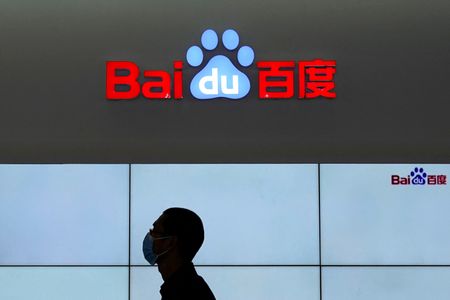 1
1 1
1
By Summer Zhen
HONG KONG (Reuters) – A set of bumper earnings reports from the likes of Baidu Inc and other Chinese internet giants isn’t impressing hedge funds and other investors who have cut exposure to the stocks and seem to be waiting for more good news.
For the now, investors remain wary of a market overshadowed by simmering Sino-U.S. tensions over technology and geopolitics and a lack of clarity on policy and regulation.
This coolness toward the sector was displayed last week when search engine giant Baidu and e-commerce titan Alibaba Group Holdings delivered the first earnings briefings since China reopened its economy following the removal of zero-COVID curbs.
Despite easily beating expectations for their earnings and giving optimistic forecasts for the recovery in demand, shares in both companies fell.
“At this point, with geopolitical risks still high and valuations above levels just a few months ago, we are cautious,” said John Pinkel, partner of Indus Capital, a New York-based hedge fund. Pinkel says his Indus Select Strategy increased exposure in the fourth quarter but is stalling now.
China’s reopening in December after three years of COVID-19 lockdowns spurred a surge in the stock market, and analysts say hedge funds were the biggest drivers of that rally, which began at the end of October.
Mark Dong, co-founder of Minority Asset Management, who is based in Hong Kong, says expectations for Chinese growth are clouded by doubts over how Beijing plans to stimulate the economy and deal with external risks.
“The last quarter result may not reflect the full picture of the reopening as business activities will only gradually recover in 2023,” said Dong.
The internet sector index nearly doubled between late-October and January but has since fallen 20%. The Hang Seng Tech Index has also erased a third of its October-January gains.
Jon Withaar, head of Asia special situations at Pictet Asset Management, who manages a hedge fund at the Swiss asset manager, says he is a bit surprised with “how quickly the market has come off”.
“What we are seeing in the last couple of weeks is fast money taking profits. Longer term investors are taking their time,” Withaar said.
WAITING FOR PARLIAMENT
China internet stocks, mostly listed as American Depository Receipts (ADRs) or in Hong Kong, have a large exposure to foreign investors, who use heavyweights such as Alibaba as a proxy for a stake in the world’s second-biggest economy.
Global hedge funds such as Bridgewater Associates, Tiger Asset Management and Coatue Management are big holders of China internet stocks, which makes the sector more vulnerable to the global economic cycle and geopolitical tensions.
Technology stocks comprise nearly half the S&P Select China ADR index.
Steven Leung, executive director at brokerage UOB Kay Hian Hong Kong, said investors are broadly interested in ChatGPT-like artificial intelligence themes, but for now they are waiting for the next catalyst while the market remains under pressure due to the prospect of the U.S. Federal Reserve raising interest rates further.
Opening on March 5, the annual meetings of the National People’s Congress (NPC) and the Chinese People’s Political Consultative Conference (CPPCC) could provide the prompt that investors are looking for as they will set China’s economic and development goals.
“Overall everyone is looking at whether the “two sessions” would introduce more favorable policies for the platform economy, and the Fed rate,” Leung said.
Still, analysts point to the reversal in Beijing’s regulatory crackdown on the sector as a plus.
“Regulation has been easing in the past five months. Given the amount of sell down we saw in platform internet companies, this provides an opportunity for stocks to recover,” said Timothy Moe, chief Asia Pacific equity strategist at Goldman Sachs, who believes valuations are still attractive.
Withaar says he is upbeat on e-commerce players who will benefit from rising consumer spending, but negative on food delivery and short video firms due to the competition.
He’s prepared for a challenging geopolitical environment. “Unfortunately this is the paradigm that we have to tolerate, but it doesn’t stop us from investing,” he said.
(This story has been refiled to correct the company name in paragraph 10)
(Reporting by Summer Zhen; Editing by Vidya Ranganathan and Simon Cameron-Moore)